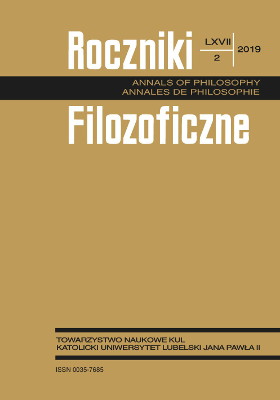The Knowledge that Provides the Soul Separated from the Body after Death according to Blessed John Duns Scotus on the Basis of Analysis Ordinatio IV d. 45 (XIV 135–197
Abstract
The essay presents some gnoseological themes with reference to the intellect of the separated soul according to John Duns Scotus. Four questions of the Ordinatio IV, d. 45 deal with these themes. In this concret cognitive situation is possible, according to Doctor Subtilis, to get to know the new quiddities of things, in spite of a lack of the empiric cognition. It means leaving behind the conception of generic empiricism and moving to the recognition of more cognitive abilities, as in Aristoteles’s conception. In a post death state (post mortem) intellect continues to have the memory of the quiddities of things known while still connected with the body and can remember concret things and events known by the senses during earthly life. Such a gnoseological notion evidences the cognitive continuity of the human intellect after death, its incorruptibility and cognitive ability at least as such as one had during earthly life. We can see here the connection of philosophic and theological questions, which mutually condition and penetrate each other. According to Scotus it is possible for the intellect of the separated soul to remember the past and to acquire new cognition. Moreover, it is also possible for such an intellect to know the prayers we refer to the blessed in heaven. Such an intellectual approach evidences a strong Augustinian influence on John Duns Scotus’ epistemic conception.
References
Aristoteles. Physica. Ed. F. Bossier, J. Brams (AL VII1.2: translatio vetus). Leiden, New York: E. J. Brill, 1990.
Bérubé, Camille. La connaissance de l’individuel au Moyen Age. Montréal, Paris: Presses de l’Uni¬versité, Presses Universitaires, 1964.
Chabada, Michal. Ján Duns Scotus. Vybrané kapitoly z jeho epistemológie a metafizyki. Brati¬slava: Filosofická Fakulta Univerzity Komenského, 2007.
Hoeres, Walter. Die Sehnsucht nach der Anschauung Gottes. Thomas von Aquin und Duns Scotus im Gespräch über Natur und Gnade. Aachen: Patrimonium-Verlag, 2015.
Honnefelder, Ludger. „Ens inquantum ens. Der Begriff des Seienden als solchen als Ge¬genstand der Methaphysik nach der Lehre des Johannes Duns Scotus”. W: Beiträge zur Ge¬schichte der Philosophie und Theologie des Mittelalters. Neue Folge. T. 16. Münster: Aschen¬dorff, 21989.
Ioannis Duns Scoti Opera omnia. T. III (Ord. I d. 3). Ed. C Carolus Balić, Martinus Bodewig, Stanislaus Bušelić, Petrus Čapkun-Delić, Barnabas Hechich, Ioannes Jurić, Bruno Korošak, Lucas Modrić, Ioseph Montalverne, Sebastianus Nanni, Faustinus Prezioso, Iulius Reinhold, Odulfus Schäfer. Civitas Vaticana: Typis Polyglottis Vaticanis, 1954.
Ioannis Duns Scoti Opera omnia. T. XVI (Lect. Prol. et d. 1–7). Ed. Carolus Balić, Martinus Bo¬dewig, Stanislaus Bušelić, Petrus Čapkun-Delić, Barnabas Hechich, Ioannes Jurić, Bruno Ko¬rošak, Lucas Modrić, Sebastianus Nanni,Iulius Reinhold, Odulfus Schäfer. Civitas Vaticana: Typis Polyglottis Vaticanis, 1960.
Ioannis Duns Scoti Opera omnia. T. XX (Lect. III d. 1–17). Ed. Barnabas Hechich, Benedictus Hucu¬lak, Ioseph Percan, Saturnino Ruiz de Loizaga, Caesar Saco Alarcón. Civitas Vaticana: Typis Vaticanis, 2003.
Ioannis Duns Scoti Opera omnia. T. IX. Ed. Barnabas Hechich,Benedictus Huculak, Ioseph Per¬can, Saturnino Ruiz de Loizaga. Civitas Vaticana: Typis Vaticanis, 2006.
Ioannis Duns Scoti Opera omnia. T. XIV (Ord. IV d. 43–49). Ed. Barnabas Hechich, Ioseph Per¬can, Stephanus Recchia, Saturnino Ruiz de Loizaga, Vitoldus Salamon, Hieronimus Pica. Civi¬tas Vaticana: Typis Vaticanis, 2013.
Langston, Douglas C. „Scotus’s Doctrine of Intuitive Cognition”. Synthese 96 (1993), 1: 3–24. DOI: 10.1007/BF01063800.
Majeran, Roman. „Różnica formalna (distinctio formalis) jako narzędzie rozumienia bytu”. W: Błogosławiony Jan Duns Szkot 1308–2008. Materiały Międzynarodowego Sympozjum z okazji 700-lecia śmierci bł. Jana Dunsa Szkota, Katolicki Uniwersytet Lubelski Jana Pawła II, 8–10 kwietnia 2008, red. Edward Iwo Zieliński OFMConv i Roman Majeran. Lublin: Wydawnictwo KUL, 2010.
Messner, Reinhold. Schauendes und begriffliches Erkennen nach Duns Skotus mit kritischer Gegen-überstellung zur Erkenntnislehre von Kant und Aristoteles. Freiburg im Breisgau: Verlag Herder, 1942.
Parisoli, Luca. La contraddizione vera. Giovanni Duns Scoto tra le necessità della metafisica e il discorso della filosofia pratica. Roma: Istituto Storico dei Cap¬puccini, 2005.
Perler, Dominik. „Gibt es eine Erinnerung nach dem Tod? Zur methodologischen Funktion der post mortem-Argumentation in der spätmittelalterlichen Erkenntnistheorie”. W: Miscellanea Mediaevalia. Veröffentlichungen des Thomas-Instituts der Universität zu Köln. T. 29: Ende und Vollendung. Eschatologische Perspektiven im Mittelalter, red. Jan A. Aertsen i Martin Pickavé. Berlin, New York: Walter de Gruyter, 2002.
Pizzo, Giovanni. Intellectus und memoria nach der Lehre des Johannes Duns Scotus. Das men¬schli¬che Erkenntisvermögen als Vollzug von Spontaneität und Rezeptivität. Veröffentli¬chungen der Johannes-Duns-Akademie für franziskanische Geistesgeschichte und Spiritualität. T. 7. Keve¬laer: Verlag Butzon & Bercker, 1998.
Pizzo, Giovanni. „Natura e funzione della memoria: il percorso scotiano tra Agostino e Aristotele”. W: Via Scoti. Metodologica ad mentem Ioannis Duns Scoti. Atti del Congresso Scotistico Inter¬nazionale Roma 9–11 marzo 1993, red. Leonardo Sileo. Roma: Edizioni Antonianum, 1993.
Salamon, Grzegorz Witold. Koncepcja poznania intuicyjnego u Jana Dunsa Szkota. Nie¬poka¬la¬nów: Wydawnictwo Ojców Franciszkanów, 2007.
Schmidt, Axel. „Intellektuele Anschauung bei Duns Scotus”. W: Franziskanische Forschungen 45 Heft: Zwischen Weisheit und Wissenschaft. Johannes Duns Scotus im Gespräch. Red. Franz Lackner. Kevelaer: Verlag Butzon & Berker, 2003.
Spruit, Leen. 1994. Species intelligibilis. From Perception to Knowledge. T. 1: Classical Roots and Medieval Discussions. Leiden, New York, Köln: E. J. Brill.
Wolter, Allan B., & Merilyn Adams McCord. „Memory and Intuition: A Focal Debate in Four¬teenth Century Cognitive Psychology”. Franciscan Studies 53 (1993): 175–192. DOI: 10.1353/frc.1993.0006.
Copyright (c) 2019 Roczniki Filozoficzne

This work is licensed under a Creative Commons Attribution-NonCommercial-NoDerivatives 4.0 International License.





